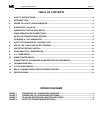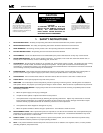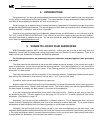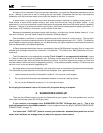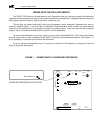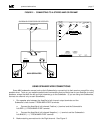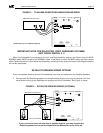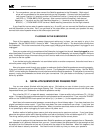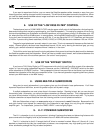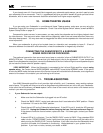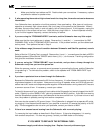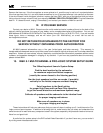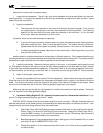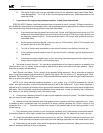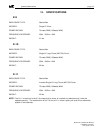
page 15powered subwoofers
D. THX Dolby Digital units have an adjustable limiter for the subwoofer feed, called “Bass Peak
Level Management”. Turn it off, or set it for the highest possible level. M&K subwoofers do not
need this limiter.
7. If you have a Pro-Logic only processor/receiver, follow these instructions.
SPECIAL NOTE: Always check the processor/receiver/receiver’s owner’s manual. Different manufactur-
ers use different descriptions for the same function, and sometimes the same description for different functions!
Your component may use terminology different from that used below.
A. If the component has high-pass filters for the Left, Center, and Right channels (usually only THX
components have these filters), they should be turned on or set to THX (if you have a choice, use
the frequency closest to 80 Hz. The
surround
channels in a Pro-Logic only system do not have
switchable filters.
B. Set the center channel to Normal, unless you have a THX controller. With a THX controller, set
the center channel to the THX setting.
C. Turn off all limiters and compressors, auto azimuth controls, auto balance controls, etc.
D. If the processor/receiver/receiver has an input level control, calibrate it per the manufacturer’s
instructions.
E. If the component has a digital input, and you are using a source component with a digital output,
always use the digital input, not the analog input.
8. Set levels for each channel. You can take a measurement at the listening position to establish the
reference level, but it is usually more accurate to take levels at about one meter from each speaker. Set all
channels to exactly the same level.
Use a Sound Level Meter. Point it directly at the speaker being measured. Set all channels to the same
level, using the processor/receiver/receiver’s internal test signal. Set the meter to “C” weighting and “Slow”
response. Set the levels to 75 dB if you have a THX processor/receiver/receiver or are using the Video Essentials
disc as a source for setting levels.
NOTE: If you using identical speakers anywhere in your system (e.g., S-150THX speakers for the left,
center, and right channels), all of those channels should be set to the same level. If your meter measures a
different level, it is probably a limitation of this type of meter measurement method and not an actual audible level
difference. Set the channels using identical speakers to the same level, unless you actually hear a difference
later when you are doing listening to verify the system setup.
9. Check phase. Make sure that all five main channel speakers are wired in phase. The Video Essentials
disc has tests for main speaker phase.
10. Make sure that the subwoofer and main speakers are in phase at the 80 Hz crossover point. Listen
to something with a consistent bass line around 80 Hz while a partner switches the “Phase” control on the
subwoofer from “+” to “-”. The switch position that results in the greatest bass at the listening position is the
correct setting.
11. Play something that is familiar to you through the system to verify the system’s overall performance.
If something does no sound right, recheck your connections and settings. Re-measure, re-check, re-align.
12. Switch the processor/receiver to each input that you will use. Check your settings for each input and
each mode. Some processor/receivers require that you enter settings separately for each mode and/or input.
13. Before playing the system, check levels and speaker alignment one last time. Make sure that you write
down all processor settings for future reference.




